A Critical Analysis: Organisational Learning vs. Learning Organisation
VerifiedAdded on 2022/12/22
|12
|3251
|60
Report
AI Summary
This report critically analyzes the differences between organisational learning and a learning organisation. It begins by defining organisational learning as a process of improving through experience and knowledge creation, distribution, and retention. The report explores the contributions of Chris Argyris and Donald Schon, focusing on the theory that learning stems from inquiry when actual outcomes differ from expected ones. It then delves into the significance of organisational learning, highlighting its role in job satisfaction, reduced employee turnover, and improved productivity. The report illustrates the organisational learning model, including single, double, and deutero learning loops. The advantages and disadvantages of organisational learning are also discussed. The report then shifts to learning organisation theory, as conceptualized by Peter Senge, emphasizing flexibility and continuous transformation. It outlines key elements of a learning organisation, such as open boundaries, team-based structures, information sharing, shared vision, collaboration, and a learning-focused culture. The report also presents the advantages and disadvantages of learning organisations, including innovativeness, adaptability, and the potential for competitive advantage. The report concludes by summarizing the key differences and relationships between the two concepts.

Top13863 6004
1
1
Paraphrase This Document
Need a fresh take? Get an instant paraphrase of this document with our AI Paraphraser
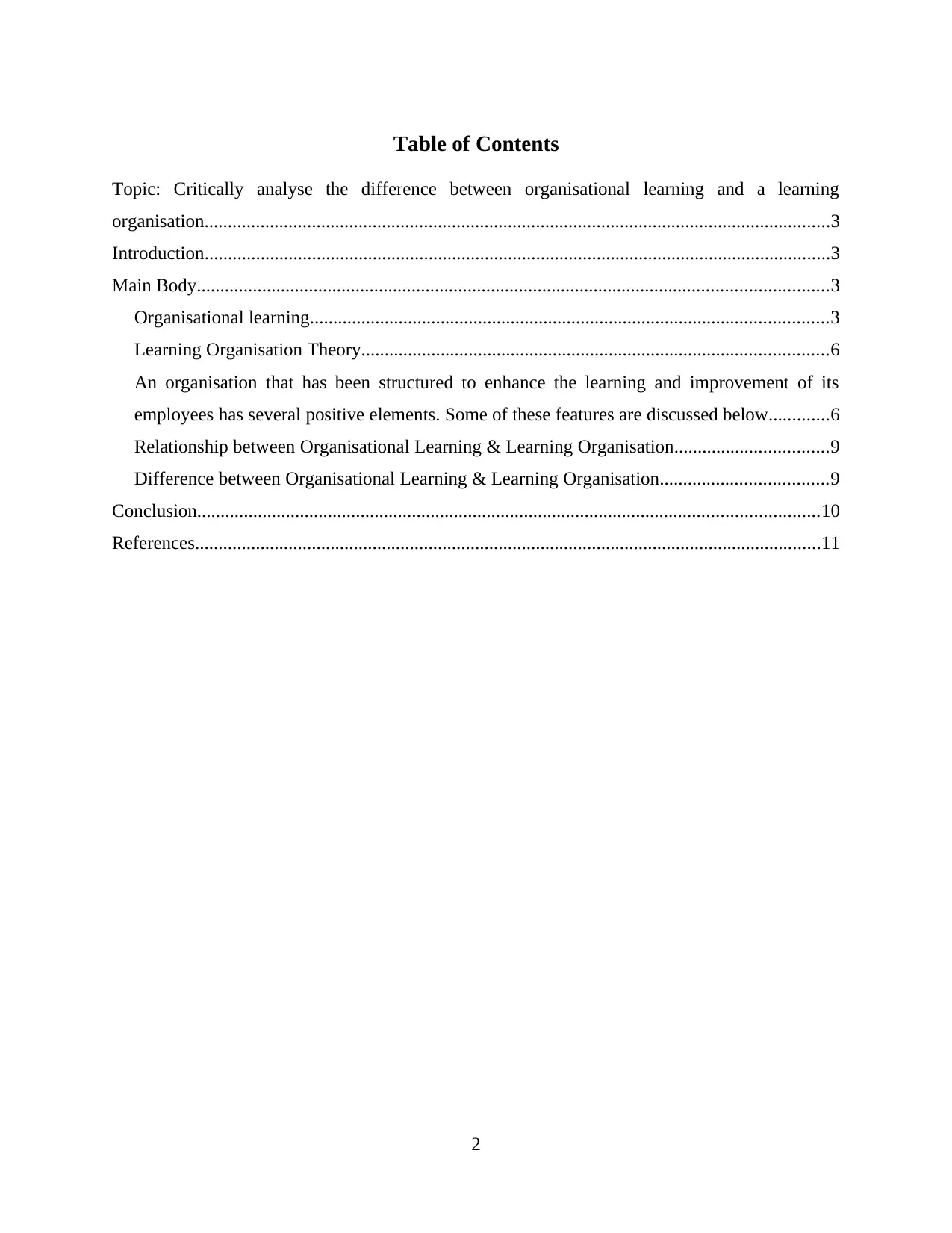
Table of Contents
Topic: Critically analyse the difference between organisational learning and a learning
organisation......................................................................................................................................3
Introduction......................................................................................................................................3
Main Body.......................................................................................................................................3
Organisational learning...............................................................................................................3
Learning Organisation Theory....................................................................................................6
An organisation that has been structured to enhance the learning and improvement of its
employees has several positive elements. Some of these features are discussed below.............6
Relationship between Organisational Learning & Learning Organisation.................................9
Difference between Organisational Learning & Learning Organisation....................................9
Conclusion.....................................................................................................................................10
References......................................................................................................................................11
2
Topic: Critically analyse the difference between organisational learning and a learning
organisation......................................................................................................................................3
Introduction......................................................................................................................................3
Main Body.......................................................................................................................................3
Organisational learning...............................................................................................................3
Learning Organisation Theory....................................................................................................6
An organisation that has been structured to enhance the learning and improvement of its
employees has several positive elements. Some of these features are discussed below.............6
Relationship between Organisational Learning & Learning Organisation.................................9
Difference between Organisational Learning & Learning Organisation....................................9
Conclusion.....................................................................................................................................10
References......................................................................................................................................11
2
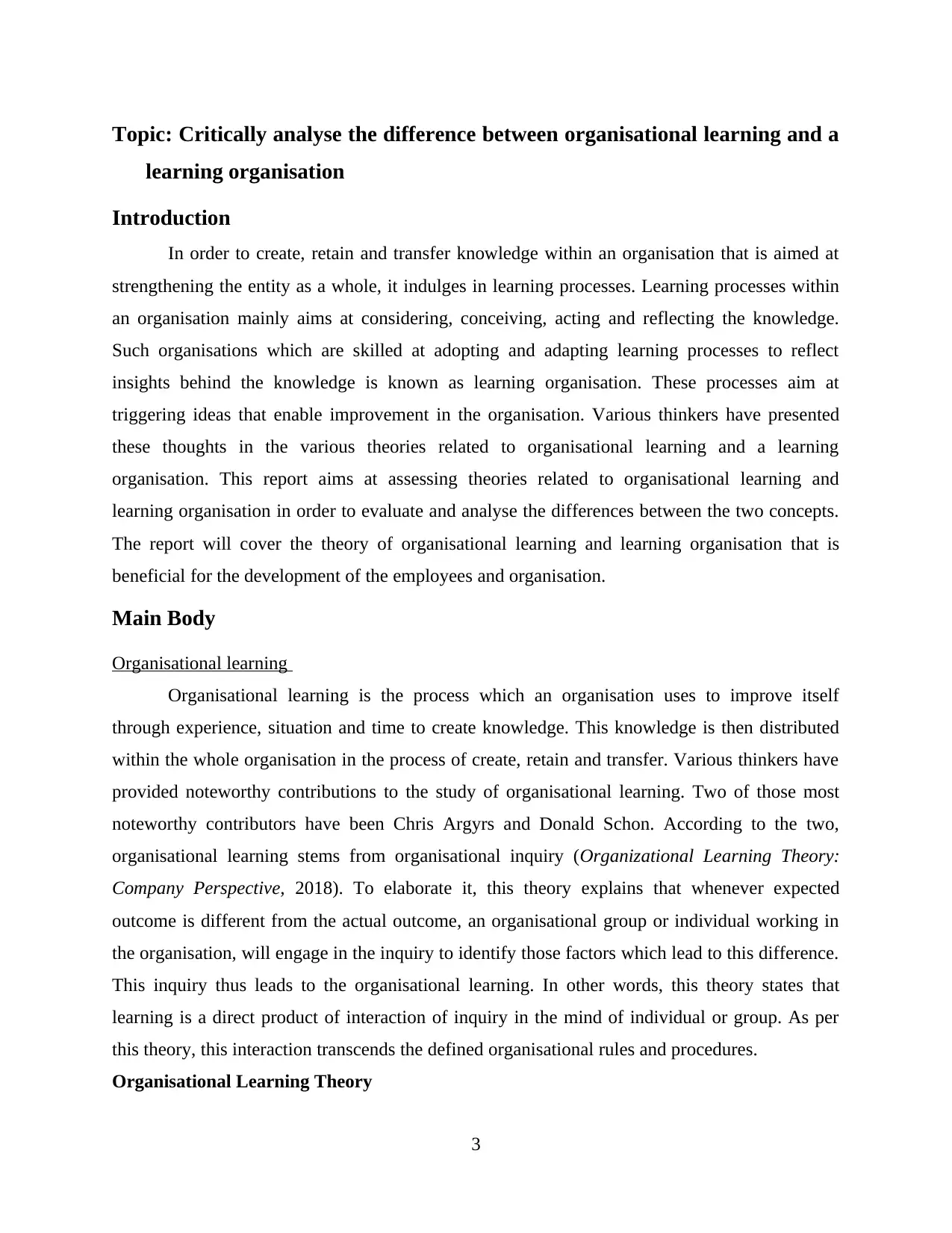
Topic: Critically analyse the difference between organisational learning and a
learning organisation
Introduction
In order to create, retain and transfer knowledge within an organisation that is aimed at
strengthening the entity as a whole, it indulges in learning processes. Learning processes within
an organisation mainly aims at considering, conceiving, acting and reflecting the knowledge.
Such organisations which are skilled at adopting and adapting learning processes to reflect
insights behind the knowledge is known as learning organisation. These processes aim at
triggering ideas that enable improvement in the organisation. Various thinkers have presented
these thoughts in the various theories related to organisational learning and a learning
organisation. This report aims at assessing theories related to organisational learning and
learning organisation in order to evaluate and analyse the differences between the two concepts.
The report will cover the theory of organisational learning and learning organisation that is
beneficial for the development of the employees and organisation.
Main Body
Organisational learning
Organisational learning is the process which an organisation uses to improve itself
through experience, situation and time to create knowledge. This knowledge is then distributed
within the whole organisation in the process of create, retain and transfer. Various thinkers have
provided noteworthy contributions to the study of organisational learning. Two of those most
noteworthy contributors have been Chris Argyrs and Donald Schon. According to the two,
organisational learning stems from organisational inquiry (Organizational Learning Theory:
Company Perspective, 2018). To elaborate it, this theory explains that whenever expected
outcome is different from the actual outcome, an organisational group or individual working in
the organisation, will engage in the inquiry to identify those factors which lead to this difference.
This inquiry thus leads to the organisational learning. In other words, this theory states that
learning is a direct product of interaction of inquiry in the mind of individual or group. As per
this theory, this interaction transcends the defined organisational rules and procedures.
Organisational Learning Theory
3
learning organisation
Introduction
In order to create, retain and transfer knowledge within an organisation that is aimed at
strengthening the entity as a whole, it indulges in learning processes. Learning processes within
an organisation mainly aims at considering, conceiving, acting and reflecting the knowledge.
Such organisations which are skilled at adopting and adapting learning processes to reflect
insights behind the knowledge is known as learning organisation. These processes aim at
triggering ideas that enable improvement in the organisation. Various thinkers have presented
these thoughts in the various theories related to organisational learning and a learning
organisation. This report aims at assessing theories related to organisational learning and
learning organisation in order to evaluate and analyse the differences between the two concepts.
The report will cover the theory of organisational learning and learning organisation that is
beneficial for the development of the employees and organisation.
Main Body
Organisational learning
Organisational learning is the process which an organisation uses to improve itself
through experience, situation and time to create knowledge. This knowledge is then distributed
within the whole organisation in the process of create, retain and transfer. Various thinkers have
provided noteworthy contributions to the study of organisational learning. Two of those most
noteworthy contributors have been Chris Argyrs and Donald Schon. According to the two,
organisational learning stems from organisational inquiry (Organizational Learning Theory:
Company Perspective, 2018). To elaborate it, this theory explains that whenever expected
outcome is different from the actual outcome, an organisational group or individual working in
the organisation, will engage in the inquiry to identify those factors which lead to this difference.
This inquiry thus leads to the organisational learning. In other words, this theory states that
learning is a direct product of interaction of inquiry in the mind of individual or group. As per
this theory, this interaction transcends the defined organisational rules and procedures.
Organisational Learning Theory
3
⊘ This is a preview!⊘
Do you want full access?
Subscribe today to unlock all pages.

Trusted by 1+ million students worldwide
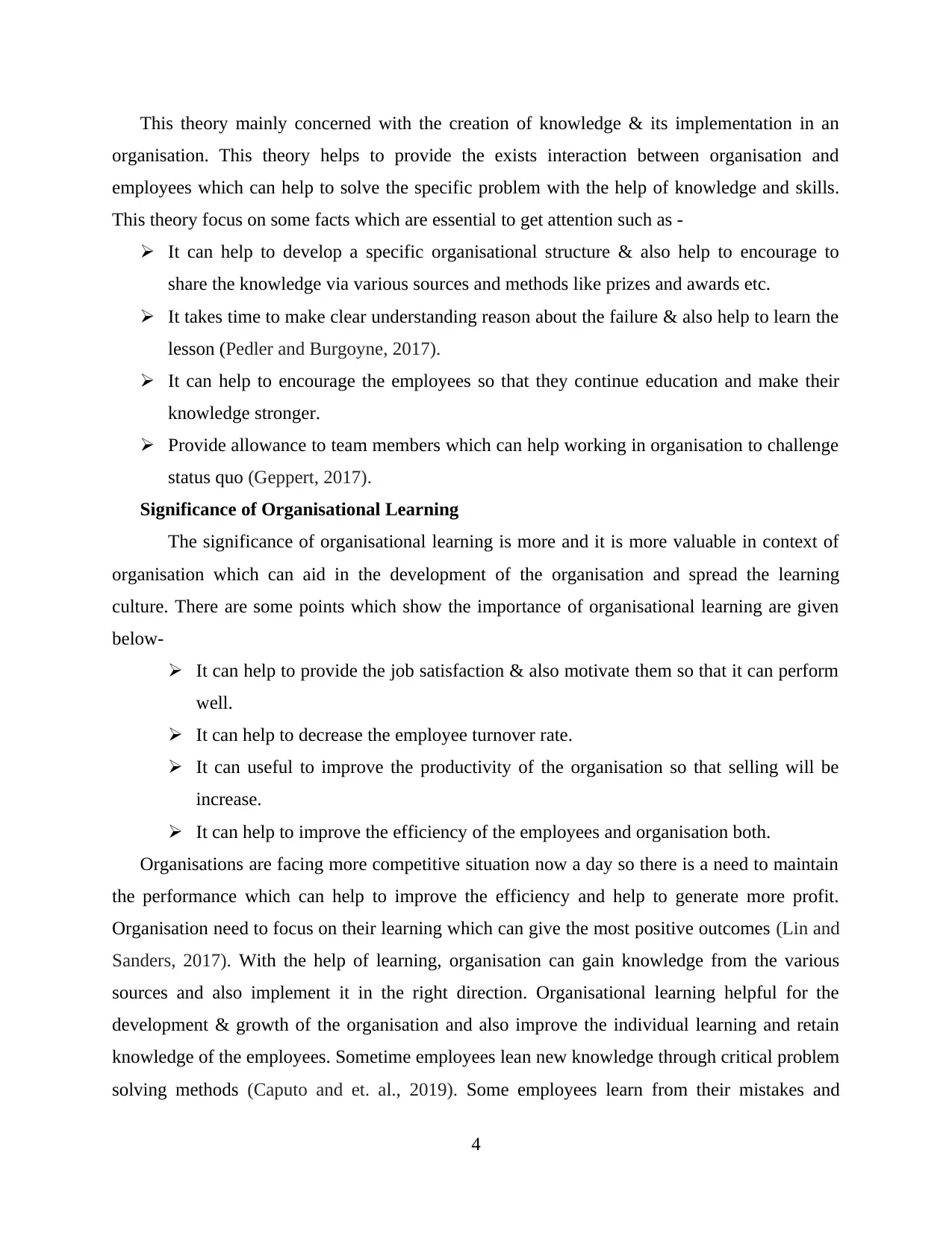
This theory mainly concerned with the creation of knowledge & its implementation in an
organisation. This theory helps to provide the exists interaction between organisation and
employees which can help to solve the specific problem with the help of knowledge and skills.
This theory focus on some facts which are essential to get attention such as -
It can help to develop a specific organisational structure & also help to encourage to
share the knowledge via various sources and methods like prizes and awards etc.
It takes time to make clear understanding reason about the failure & also help to learn the
lesson (Pedler and Burgoyne, 2017).
It can help to encourage the employees so that they continue education and make their
knowledge stronger.
Provide allowance to team members which can help working in organisation to challenge
status quo (Geppert, 2017).
Significance of Organisational Learning
The significance of organisational learning is more and it is more valuable in context of
organisation which can aid in the development of the organisation and spread the learning
culture. There are some points which show the importance of organisational learning are given
below-
It can help to provide the job satisfaction & also motivate them so that it can perform
well.
It can help to decrease the employee turnover rate.
It can useful to improve the productivity of the organisation so that selling will be
increase.
It can help to improve the efficiency of the employees and organisation both.
Organisations are facing more competitive situation now a day so there is a need to maintain
the performance which can help to improve the efficiency and help to generate more profit.
Organisation need to focus on their learning which can give the most positive outcomes (Lin and
Sanders, 2017). With the help of learning, organisation can gain knowledge from the various
sources and also implement it in the right direction. Organisational learning helpful for the
development & growth of the organisation and also improve the individual learning and retain
knowledge of the employees. Sometime employees lean new knowledge through critical problem
solving methods (Caputo and et. al., 2019). Some employees learn from their mistakes and
4
organisation. This theory helps to provide the exists interaction between organisation and
employees which can help to solve the specific problem with the help of knowledge and skills.
This theory focus on some facts which are essential to get attention such as -
It can help to develop a specific organisational structure & also help to encourage to
share the knowledge via various sources and methods like prizes and awards etc.
It takes time to make clear understanding reason about the failure & also help to learn the
lesson (Pedler and Burgoyne, 2017).
It can help to encourage the employees so that they continue education and make their
knowledge stronger.
Provide allowance to team members which can help working in organisation to challenge
status quo (Geppert, 2017).
Significance of Organisational Learning
The significance of organisational learning is more and it is more valuable in context of
organisation which can aid in the development of the organisation and spread the learning
culture. There are some points which show the importance of organisational learning are given
below-
It can help to provide the job satisfaction & also motivate them so that it can perform
well.
It can help to decrease the employee turnover rate.
It can useful to improve the productivity of the organisation so that selling will be
increase.
It can help to improve the efficiency of the employees and organisation both.
Organisations are facing more competitive situation now a day so there is a need to maintain
the performance which can help to improve the efficiency and help to generate more profit.
Organisation need to focus on their learning which can give the most positive outcomes (Lin and
Sanders, 2017). With the help of learning, organisation can gain knowledge from the various
sources and also implement it in the right direction. Organisational learning helpful for the
development & growth of the organisation and also improve the individual learning and retain
knowledge of the employees. Sometime employees lean new knowledge through critical problem
solving methods (Caputo and et. al., 2019). Some employees learn from their mistakes and
4
Paraphrase This Document
Need a fresh take? Get an instant paraphrase of this document with our AI Paraphraser
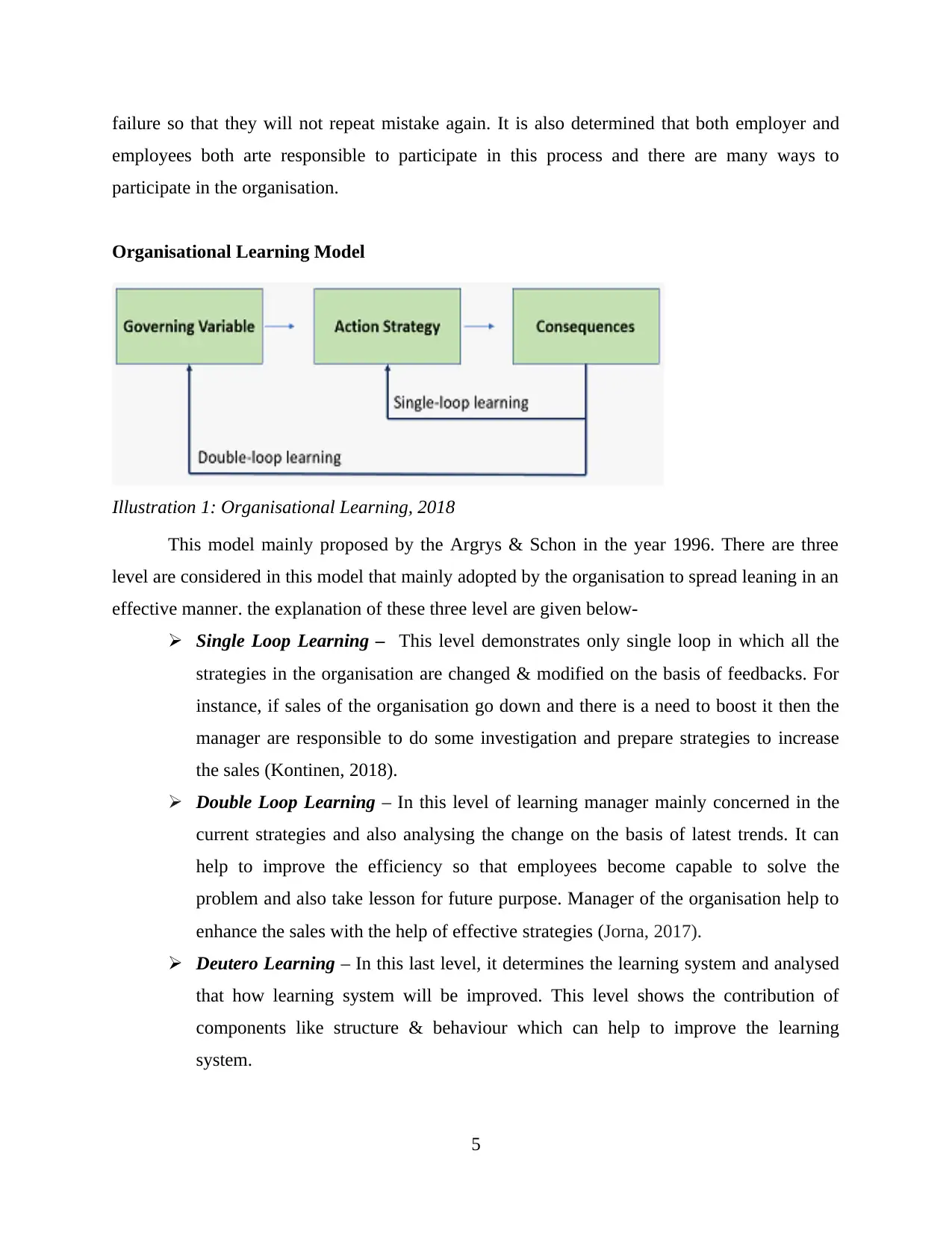
failure so that they will not repeat mistake again. It is also determined that both employer and
employees both arte responsible to participate in this process and there are many ways to
participate in the organisation.
Organisational Learning Model
Illustration 1: Organisational Learning, 2018
This model mainly proposed by the Argrys & Schon in the year 1996. There are three
level are considered in this model that mainly adopted by the organisation to spread leaning in an
effective manner. the explanation of these three level are given below-
Single Loop Learning – This level demonstrates only single loop in which all the
strategies in the organisation are changed & modified on the basis of feedbacks. For
instance, if sales of the organisation go down and there is a need to boost it then the
manager are responsible to do some investigation and prepare strategies to increase
the sales (Kontinen, 2018).
Double Loop Learning – In this level of learning manager mainly concerned in the
current strategies and also analysing the change on the basis of latest trends. It can
help to improve the efficiency so that employees become capable to solve the
problem and also take lesson for future purpose. Manager of the organisation help to
enhance the sales with the help of effective strategies (Jorna, 2017).
Deutero Learning – In this last level, it determines the learning system and analysed
that how learning system will be improved. This level shows the contribution of
components like structure & behaviour which can help to improve the learning
system.
5
employees both arte responsible to participate in this process and there are many ways to
participate in the organisation.
Organisational Learning Model
Illustration 1: Organisational Learning, 2018
This model mainly proposed by the Argrys & Schon in the year 1996. There are three
level are considered in this model that mainly adopted by the organisation to spread leaning in an
effective manner. the explanation of these three level are given below-
Single Loop Learning – This level demonstrates only single loop in which all the
strategies in the organisation are changed & modified on the basis of feedbacks. For
instance, if sales of the organisation go down and there is a need to boost it then the
manager are responsible to do some investigation and prepare strategies to increase
the sales (Kontinen, 2018).
Double Loop Learning – In this level of learning manager mainly concerned in the
current strategies and also analysing the change on the basis of latest trends. It can
help to improve the efficiency so that employees become capable to solve the
problem and also take lesson for future purpose. Manager of the organisation help to
enhance the sales with the help of effective strategies (Jorna, 2017).
Deutero Learning – In this last level, it determines the learning system and analysed
that how learning system will be improved. This level shows the contribution of
components like structure & behaviour which can help to improve the learning
system.
5
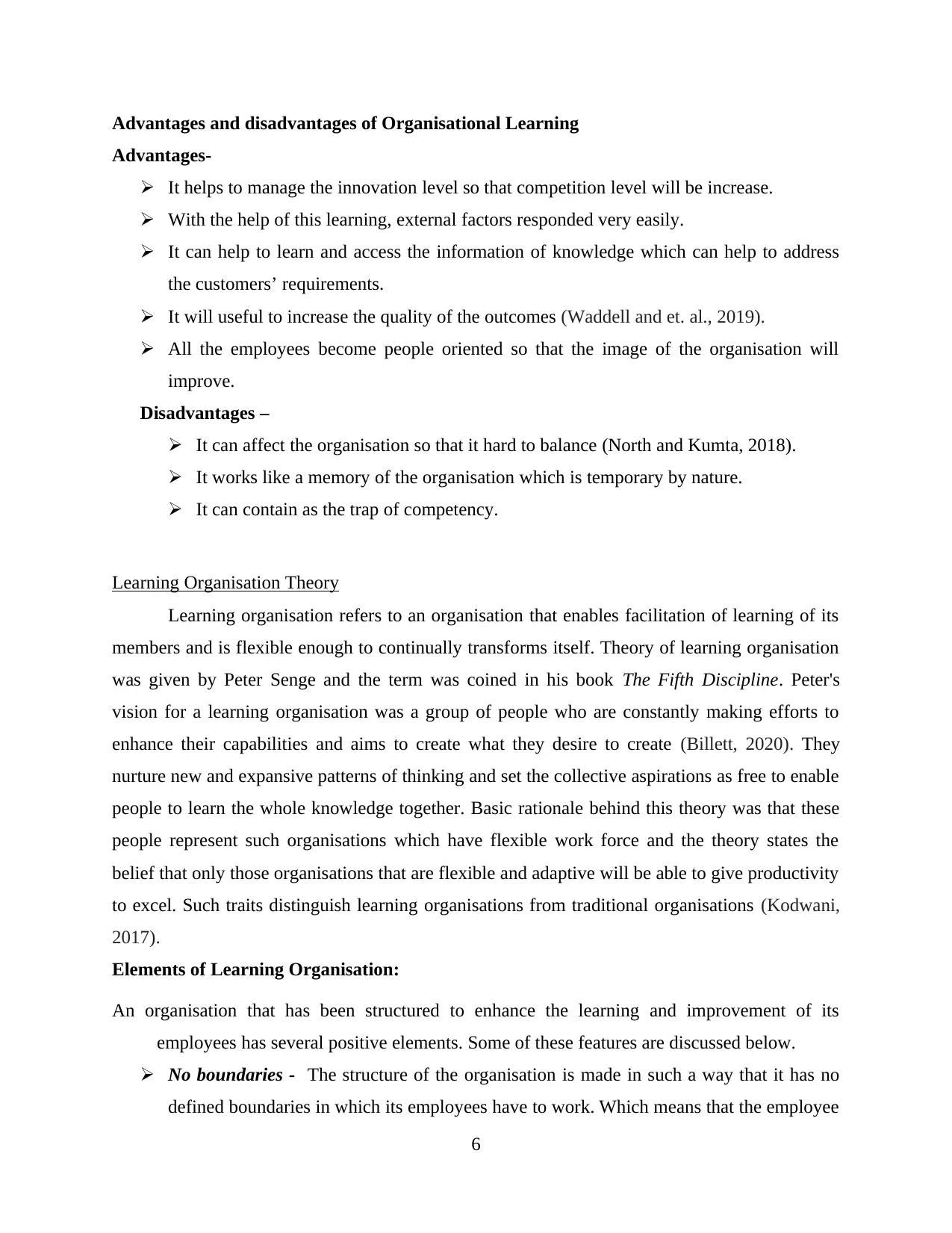
Advantages and disadvantages of Organisational Learning
Advantages-
It helps to manage the innovation level so that competition level will be increase.
With the help of this learning, external factors responded very easily.
It can help to learn and access the information of knowledge which can help to address
the customers’ requirements.
It will useful to increase the quality of the outcomes (Waddell and et. al., 2019).
All the employees become people oriented so that the image of the organisation will
improve.
Disadvantages –
It can affect the organisation so that it hard to balance (North and Kumta, 2018).
It works like a memory of the organisation which is temporary by nature.
It can contain as the trap of competency.
Learning Organisation Theory
Learning organisation refers to an organisation that enables facilitation of learning of its
members and is flexible enough to continually transforms itself. Theory of learning organisation
was given by Peter Senge and the term was coined in his book The Fifth Discipline. Peter's
vision for a learning organisation was a group of people who are constantly making efforts to
enhance their capabilities and aims to create what they desire to create (Billett, 2020). They
nurture new and expansive patterns of thinking and set the collective aspirations as free to enable
people to learn the whole knowledge together. Basic rationale behind this theory was that these
people represent such organisations which have flexible work force and the theory states the
belief that only those organisations that are flexible and adaptive will be able to give productivity
to excel. Such traits distinguish learning organisations from traditional organisations (Kodwani,
2017).
Elements of Learning Organisation:
An organisation that has been structured to enhance the learning and improvement of its
employees has several positive elements. Some of these features are discussed below.
No boundaries - The structure of the organisation is made in such a way that it has no
defined boundaries in which its employees have to work. Which means that the employee
6
Advantages-
It helps to manage the innovation level so that competition level will be increase.
With the help of this learning, external factors responded very easily.
It can help to learn and access the information of knowledge which can help to address
the customers’ requirements.
It will useful to increase the quality of the outcomes (Waddell and et. al., 2019).
All the employees become people oriented so that the image of the organisation will
improve.
Disadvantages –
It can affect the organisation so that it hard to balance (North and Kumta, 2018).
It works like a memory of the organisation which is temporary by nature.
It can contain as the trap of competency.
Learning Organisation Theory
Learning organisation refers to an organisation that enables facilitation of learning of its
members and is flexible enough to continually transforms itself. Theory of learning organisation
was given by Peter Senge and the term was coined in his book The Fifth Discipline. Peter's
vision for a learning organisation was a group of people who are constantly making efforts to
enhance their capabilities and aims to create what they desire to create (Billett, 2020). They
nurture new and expansive patterns of thinking and set the collective aspirations as free to enable
people to learn the whole knowledge together. Basic rationale behind this theory was that these
people represent such organisations which have flexible work force and the theory states the
belief that only those organisations that are flexible and adaptive will be able to give productivity
to excel. Such traits distinguish learning organisations from traditional organisations (Kodwani,
2017).
Elements of Learning Organisation:
An organisation that has been structured to enhance the learning and improvement of its
employees has several positive elements. Some of these features are discussed below.
No boundaries - The structure of the organisation is made in such a way that it has no
defined boundaries in which its employees have to work. Which means that the employee
6
⊘ This is a preview!⊘
Do you want full access?
Subscribe today to unlock all pages.

Trusted by 1+ million students worldwide
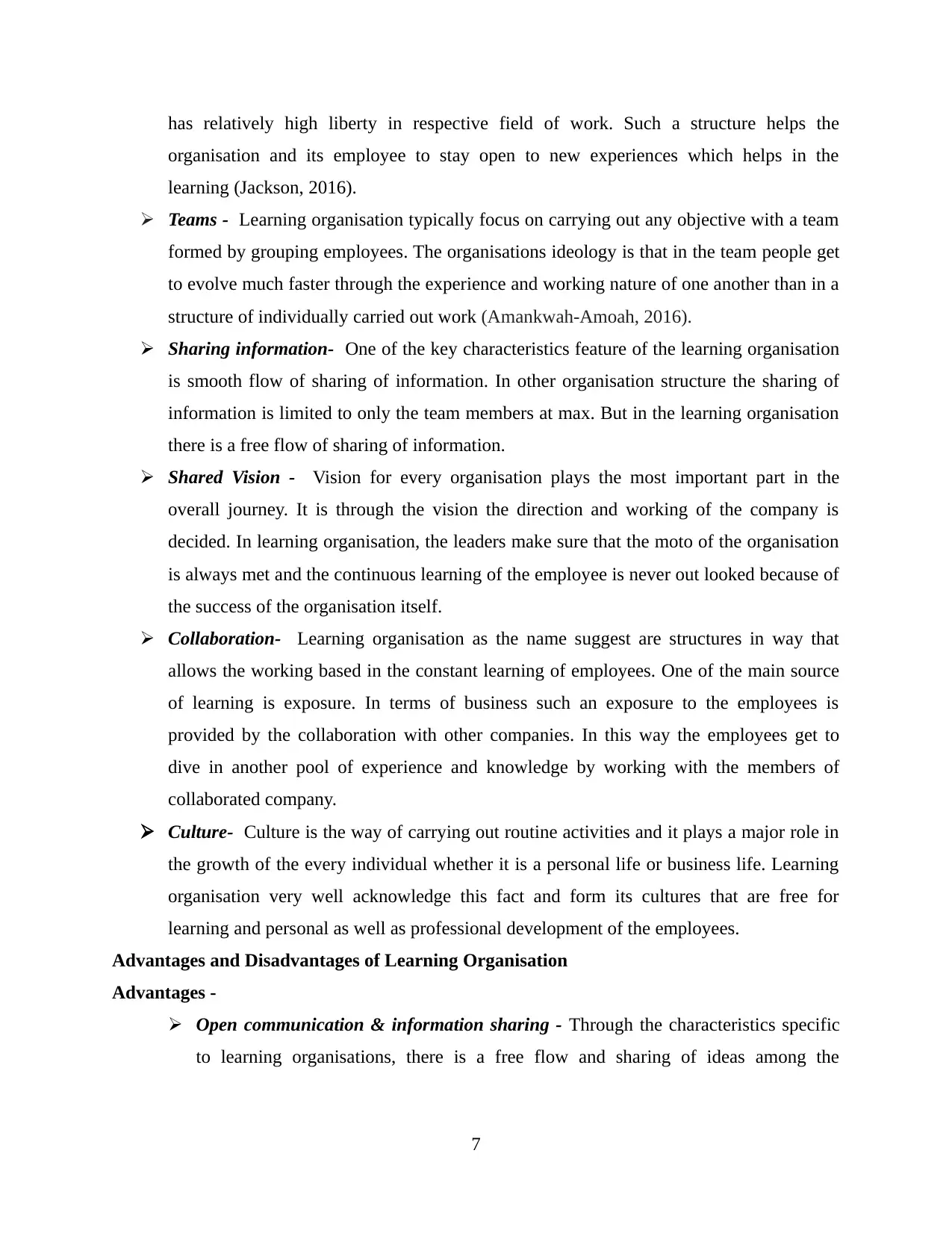
has relatively high liberty in respective field of work. Such a structure helps the
organisation and its employee to stay open to new experiences which helps in the
learning (Jackson, 2016).
Teams - Learning organisation typically focus on carrying out any objective with a team
formed by grouping employees. The organisations ideology is that in the team people get
to evolve much faster through the experience and working nature of one another than in a
structure of individually carried out work (Amankwah-Amoah, 2016).
Sharing information- One of the key characteristics feature of the learning organisation
is smooth flow of sharing of information. In other organisation structure the sharing of
information is limited to only the team members at max. But in the learning organisation
there is a free flow of sharing of information.
Shared Vision - Vision for every organisation plays the most important part in the
overall journey. It is through the vision the direction and working of the company is
decided. In learning organisation, the leaders make sure that the moto of the organisation
is always met and the continuous learning of the employee is never out looked because of
the success of the organisation itself.
Collaboration- Learning organisation as the name suggest are structures in way that
allows the working based in the constant learning of employees. One of the main source
of learning is exposure. In terms of business such an exposure to the employees is
provided by the collaboration with other companies. In this way the employees get to
dive in another pool of experience and knowledge by working with the members of
collaborated company.
Culture- Culture is the way of carrying out routine activities and it plays a major role in
the growth of the every individual whether it is a personal life or business life. Learning
organisation very well acknowledge this fact and form its cultures that are free for
learning and personal as well as professional development of the employees.
Advantages and Disadvantages of Learning Organisation
Advantages -
Open communication & information sharing - Through the characteristics specific
to learning organisations, there is a free flow and sharing of ideas among the
7
organisation and its employee to stay open to new experiences which helps in the
learning (Jackson, 2016).
Teams - Learning organisation typically focus on carrying out any objective with a team
formed by grouping employees. The organisations ideology is that in the team people get
to evolve much faster through the experience and working nature of one another than in a
structure of individually carried out work (Amankwah-Amoah, 2016).
Sharing information- One of the key characteristics feature of the learning organisation
is smooth flow of sharing of information. In other organisation structure the sharing of
information is limited to only the team members at max. But in the learning organisation
there is a free flow of sharing of information.
Shared Vision - Vision for every organisation plays the most important part in the
overall journey. It is through the vision the direction and working of the company is
decided. In learning organisation, the leaders make sure that the moto of the organisation
is always met and the continuous learning of the employee is never out looked because of
the success of the organisation itself.
Collaboration- Learning organisation as the name suggest are structures in way that
allows the working based in the constant learning of employees. One of the main source
of learning is exposure. In terms of business such an exposure to the employees is
provided by the collaboration with other companies. In this way the employees get to
dive in another pool of experience and knowledge by working with the members of
collaborated company.
Culture- Culture is the way of carrying out routine activities and it plays a major role in
the growth of the every individual whether it is a personal life or business life. Learning
organisation very well acknowledge this fact and form its cultures that are free for
learning and personal as well as professional development of the employees.
Advantages and Disadvantages of Learning Organisation
Advantages -
Open communication & information sharing - Through the characteristics specific
to learning organisations, there is a free flow and sharing of ideas among the
7
Paraphrase This Document
Need a fresh take? Get an instant paraphrase of this document with our AI Paraphraser
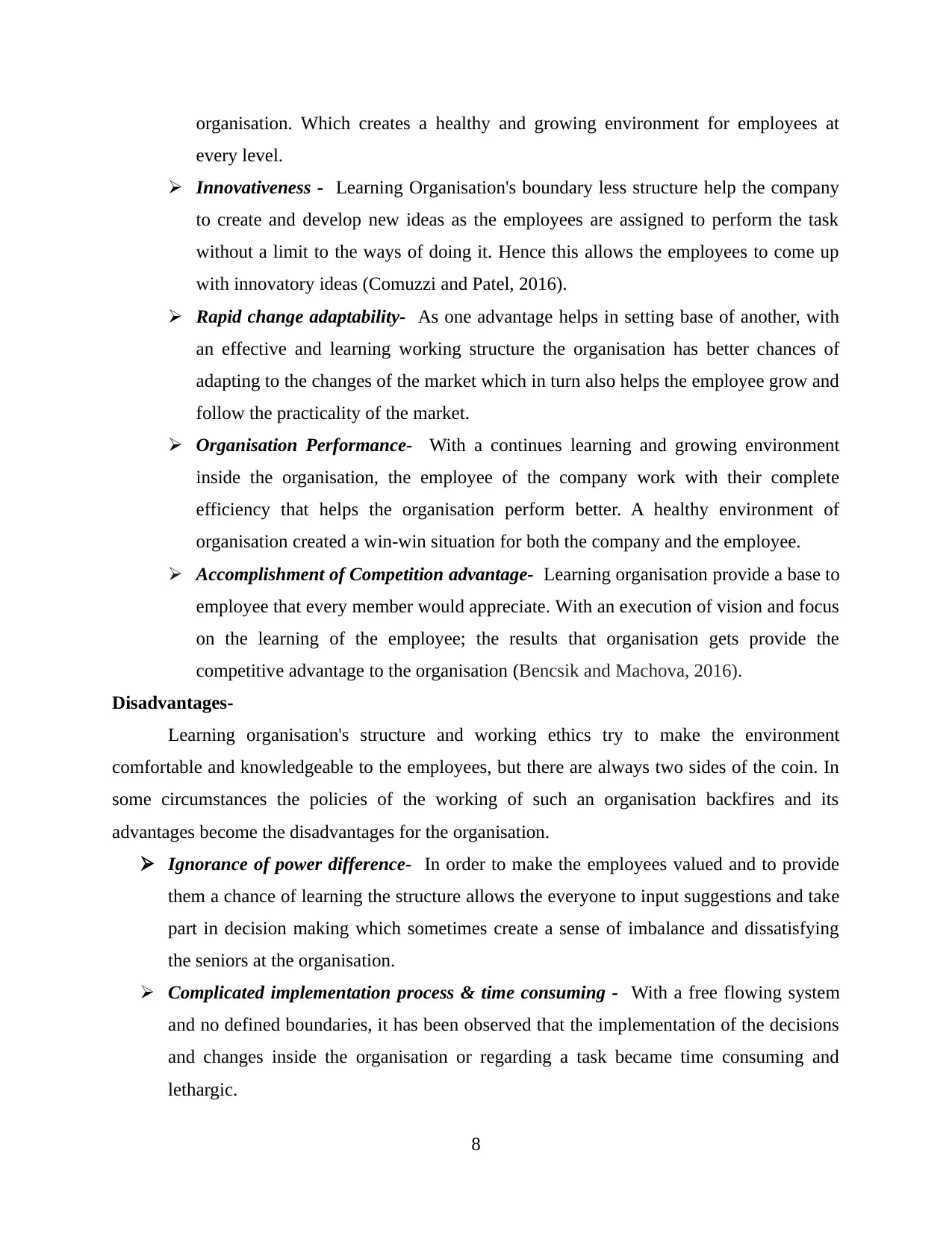
organisation. Which creates a healthy and growing environment for employees at
every level.
Innovativeness - Learning Organisation's boundary less structure help the company
to create and develop new ideas as the employees are assigned to perform the task
without a limit to the ways of doing it. Hence this allows the employees to come up
with innovatory ideas (Comuzzi and Patel, 2016).
Rapid change adaptability- As one advantage helps in setting base of another, with
an effective and learning working structure the organisation has better chances of
adapting to the changes of the market which in turn also helps the employee grow and
follow the practicality of the market.
Organisation Performance- With a continues learning and growing environment
inside the organisation, the employee of the company work with their complete
efficiency that helps the organisation perform better. A healthy environment of
organisation created a win-win situation for both the company and the employee.
Accomplishment of Competition advantage- Learning organisation provide a base to
employee that every member would appreciate. With an execution of vision and focus
on the learning of the employee; the results that organisation gets provide the
competitive advantage to the organisation (Bencsik and Machova, 2016).
Disadvantages-
Learning organisation's structure and working ethics try to make the environment
comfortable and knowledgeable to the employees, but there are always two sides of the coin. In
some circumstances the policies of the working of such an organisation backfires and its
advantages become the disadvantages for the organisation.
Ignorance of power difference- In order to make the employees valued and to provide
them a chance of learning the structure allows the everyone to input suggestions and take
part in decision making which sometimes create a sense of imbalance and dissatisfying
the seniors at the organisation.
Complicated implementation process & time consuming - With a free flowing system
and no defined boundaries, it has been observed that the implementation of the decisions
and changes inside the organisation or regarding a task became time consuming and
lethargic.
8
every level.
Innovativeness - Learning Organisation's boundary less structure help the company
to create and develop new ideas as the employees are assigned to perform the task
without a limit to the ways of doing it. Hence this allows the employees to come up
with innovatory ideas (Comuzzi and Patel, 2016).
Rapid change adaptability- As one advantage helps in setting base of another, with
an effective and learning working structure the organisation has better chances of
adapting to the changes of the market which in turn also helps the employee grow and
follow the practicality of the market.
Organisation Performance- With a continues learning and growing environment
inside the organisation, the employee of the company work with their complete
efficiency that helps the organisation perform better. A healthy environment of
organisation created a win-win situation for both the company and the employee.
Accomplishment of Competition advantage- Learning organisation provide a base to
employee that every member would appreciate. With an execution of vision and focus
on the learning of the employee; the results that organisation gets provide the
competitive advantage to the organisation (Bencsik and Machova, 2016).
Disadvantages-
Learning organisation's structure and working ethics try to make the environment
comfortable and knowledgeable to the employees, but there are always two sides of the coin. In
some circumstances the policies of the working of such an organisation backfires and its
advantages become the disadvantages for the organisation.
Ignorance of power difference- In order to make the employees valued and to provide
them a chance of learning the structure allows the everyone to input suggestions and take
part in decision making which sometimes create a sense of imbalance and dissatisfying
the seniors at the organisation.
Complicated implementation process & time consuming - With a free flowing system
and no defined boundaries, it has been observed that the implementation of the decisions
and changes inside the organisation or regarding a task became time consuming and
lethargic.
8
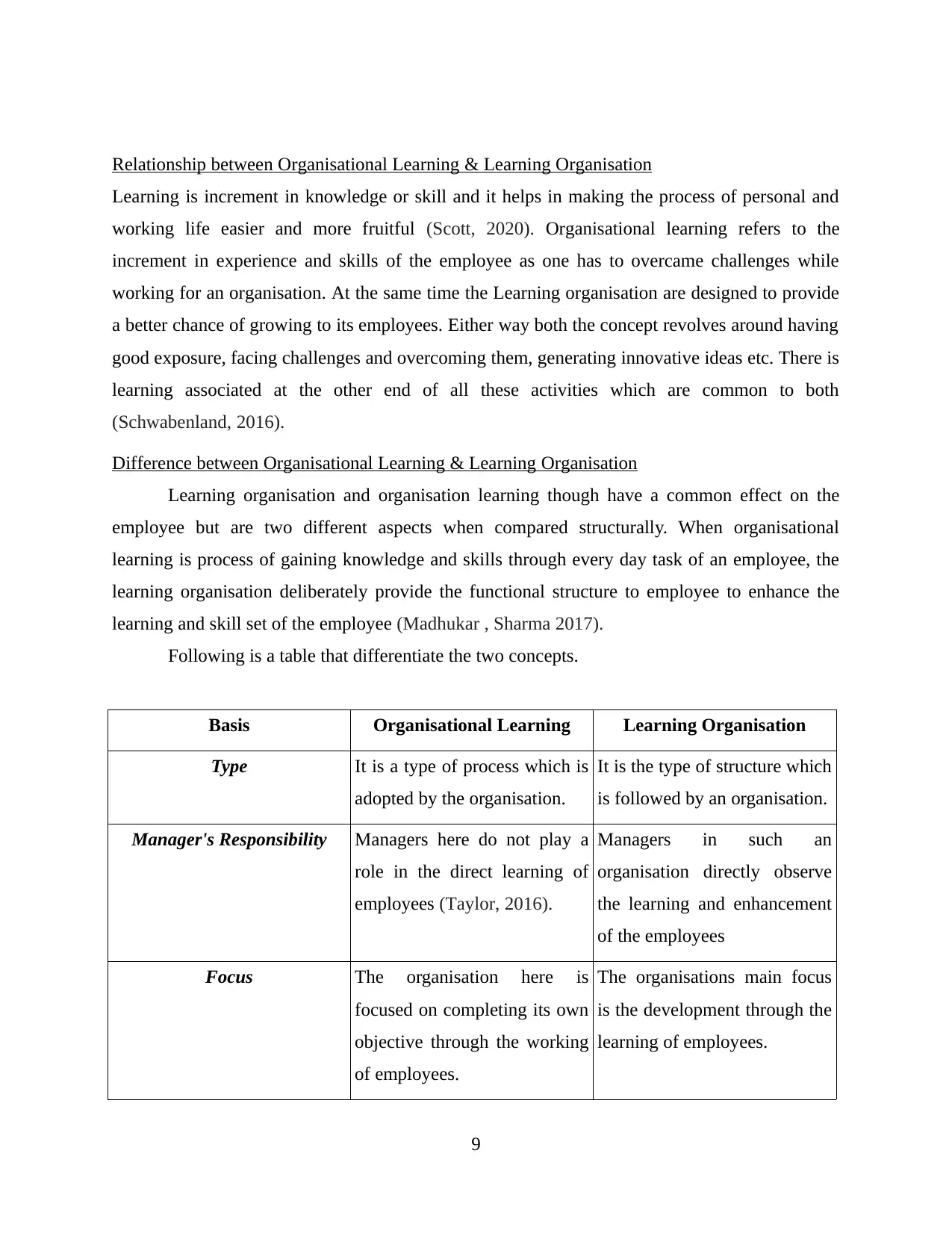
Relationship between Organisational Learning & Learning Organisation
Learning is increment in knowledge or skill and it helps in making the process of personal and
working life easier and more fruitful (Scott, 2020). Organisational learning refers to the
increment in experience and skills of the employee as one has to overcame challenges while
working for an organisation. At the same time the Learning organisation are designed to provide
a better chance of growing to its employees. Either way both the concept revolves around having
good exposure, facing challenges and overcoming them, generating innovative ideas etc. There is
learning associated at the other end of all these activities which are common to both
(Schwabenland, 2016).
Difference between Organisational Learning & Learning Organisation
Learning organisation and organisation learning though have a common effect on the
employee but are two different aspects when compared structurally. When organisational
learning is process of gaining knowledge and skills through every day task of an employee, the
learning organisation deliberately provide the functional structure to employee to enhance the
learning and skill set of the employee (Madhukar , Sharma 2017).
Following is a table that differentiate the two concepts.
Basis Organisational Learning Learning Organisation
Type It is a type of process which is
adopted by the organisation.
It is the type of structure which
is followed by an organisation.
Manager's Responsibility Managers here do not play a
role in the direct learning of
employees (Taylor, 2016).
Managers in such an
organisation directly observe
the learning and enhancement
of the employees
Focus The organisation here is
focused on completing its own
objective through the working
of employees.
The organisations main focus
is the development through the
learning of employees.
9
Learning is increment in knowledge or skill and it helps in making the process of personal and
working life easier and more fruitful (Scott, 2020). Organisational learning refers to the
increment in experience and skills of the employee as one has to overcame challenges while
working for an organisation. At the same time the Learning organisation are designed to provide
a better chance of growing to its employees. Either way both the concept revolves around having
good exposure, facing challenges and overcoming them, generating innovative ideas etc. There is
learning associated at the other end of all these activities which are common to both
(Schwabenland, 2016).
Difference between Organisational Learning & Learning Organisation
Learning organisation and organisation learning though have a common effect on the
employee but are two different aspects when compared structurally. When organisational
learning is process of gaining knowledge and skills through every day task of an employee, the
learning organisation deliberately provide the functional structure to employee to enhance the
learning and skill set of the employee (Madhukar , Sharma 2017).
Following is a table that differentiate the two concepts.
Basis Organisational Learning Learning Organisation
Type It is a type of process which is
adopted by the organisation.
It is the type of structure which
is followed by an organisation.
Manager's Responsibility Managers here do not play a
role in the direct learning of
employees (Taylor, 2016).
Managers in such an
organisation directly observe
the learning and enhancement
of the employees
Focus The organisation here is
focused on completing its own
objective through the working
of employees.
The organisations main focus
is the development through the
learning of employees.
9
⊘ This is a preview!⊘
Do you want full access?
Subscribe today to unlock all pages.

Trusted by 1+ million students worldwide
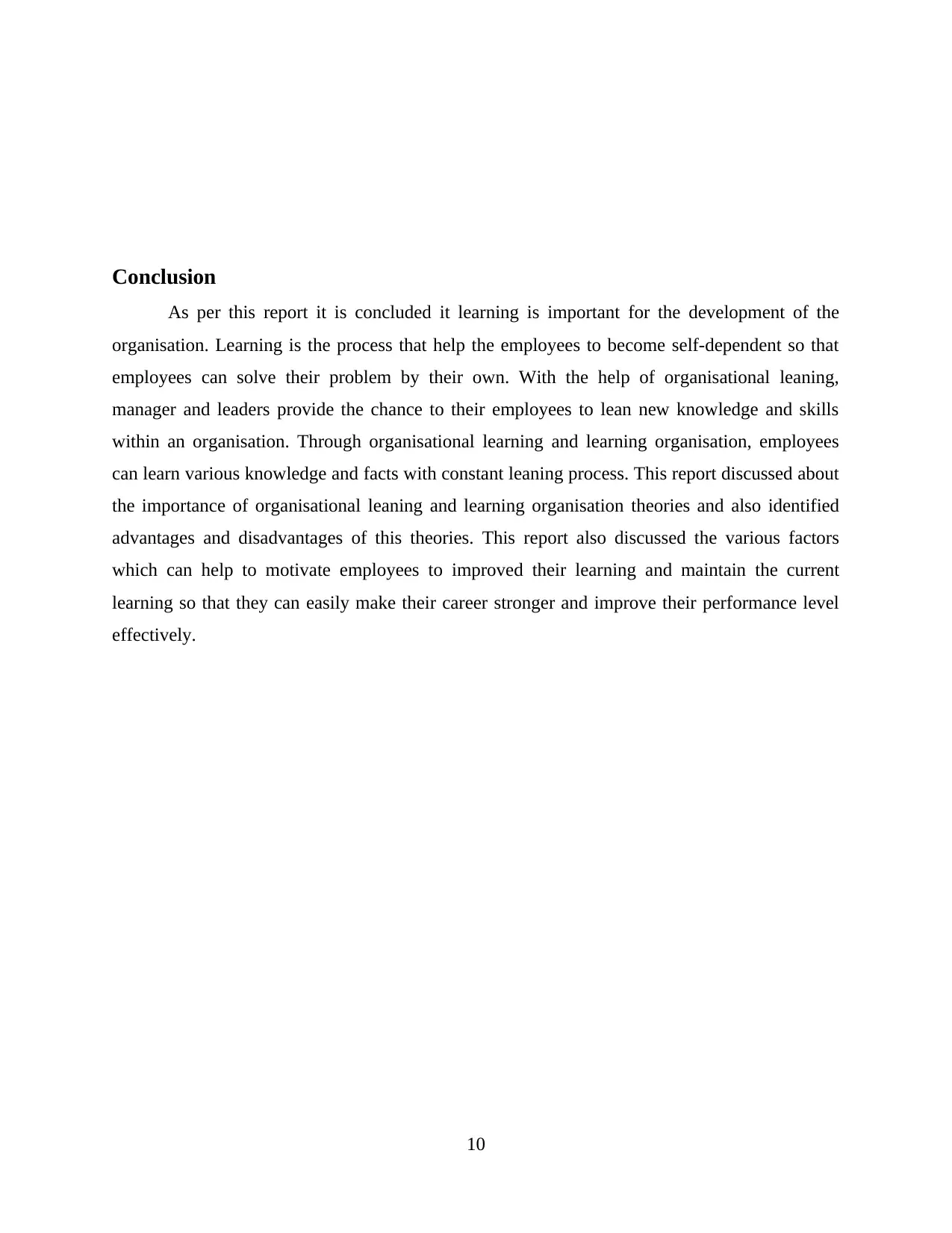
Conclusion
As per this report it is concluded it learning is important for the development of the
organisation. Learning is the process that help the employees to become self-dependent so that
employees can solve their problem by their own. With the help of organisational leaning,
manager and leaders provide the chance to their employees to lean new knowledge and skills
within an organisation. Through organisational learning and learning organisation, employees
can learn various knowledge and facts with constant leaning process. This report discussed about
the importance of organisational leaning and learning organisation theories and also identified
advantages and disadvantages of this theories. This report also discussed the various factors
which can help to motivate employees to improved their learning and maintain the current
learning so that they can easily make their career stronger and improve their performance level
effectively.
10
As per this report it is concluded it learning is important for the development of the
organisation. Learning is the process that help the employees to become self-dependent so that
employees can solve their problem by their own. With the help of organisational leaning,
manager and leaders provide the chance to their employees to lean new knowledge and skills
within an organisation. Through organisational learning and learning organisation, employees
can learn various knowledge and facts with constant leaning process. This report discussed about
the importance of organisational leaning and learning organisation theories and also identified
advantages and disadvantages of this theories. This report also discussed the various factors
which can help to motivate employees to improved their learning and maintain the current
learning so that they can easily make their career stronger and improve their performance level
effectively.
10
Paraphrase This Document
Need a fresh take? Get an instant paraphrase of this document with our AI Paraphraser
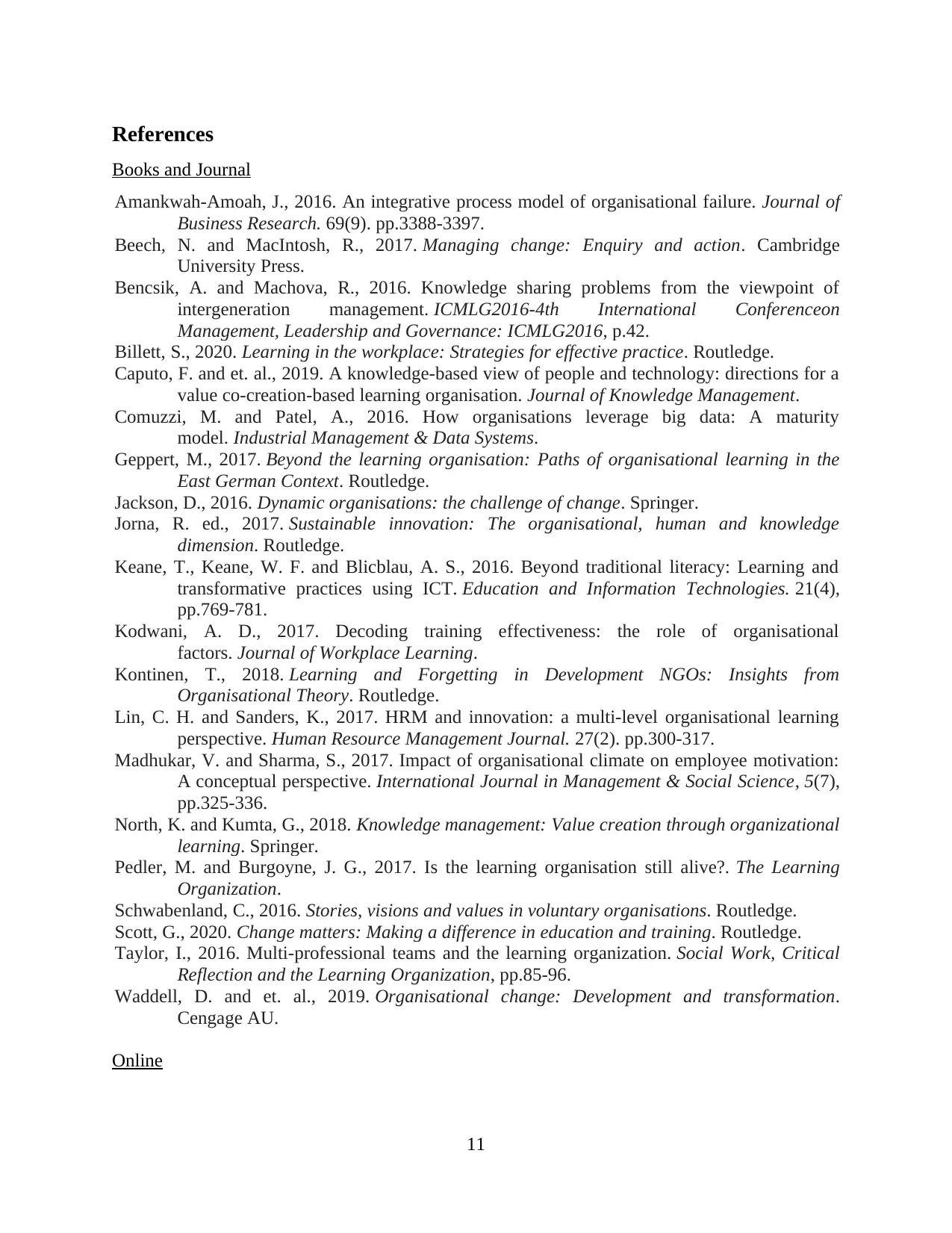
References
Books and Journal
Amankwah-Amoah, J., 2016. An integrative process model of organisational failure. Journal of
Business Research. 69(9). pp.3388-3397.
Beech, N. and MacIntosh, R., 2017. Managing change: Enquiry and action. Cambridge
University Press.
Bencsik, A. and Machova, R., 2016. Knowledge sharing problems from the viewpoint of
intergeneration management. ICMLG2016-4th International Conferenceon
Management, Leadership and Governance: ICMLG2016, p.42.
Billett, S., 2020. Learning in the workplace: Strategies for effective practice. Routledge.
Caputo, F. and et. al., 2019. A knowledge-based view of people and technology: directions for a
value co-creation-based learning organisation. Journal of Knowledge Management.
Comuzzi, M. and Patel, A., 2016. How organisations leverage big data: A maturity
model. Industrial Management & Data Systems.
Geppert, M., 2017. Beyond the learning organisation: Paths of organisational learning in the
East German Context. Routledge.
Jackson, D., 2016. Dynamic organisations: the challenge of change. Springer.
Jorna, R. ed., 2017. Sustainable innovation: The organisational, human and knowledge
dimension. Routledge.
Keane, T., Keane, W. F. and Blicblau, A. S., 2016. Beyond traditional literacy: Learning and
transformative practices using ICT. Education and Information Technologies. 21(4),
pp.769-781.
Kodwani, A. D., 2017. Decoding training effectiveness: the role of organisational
factors. Journal of Workplace Learning.
Kontinen, T., 2018. Learning and Forgetting in Development NGOs: Insights from
Organisational Theory. Routledge.
Lin, C. H. and Sanders, K., 2017. HRM and innovation: a multi‐level organisational learning
perspective. Human Resource Management Journal. 27(2). pp.300-317.
Madhukar, V. and Sharma, S., 2017. Impact of organisational climate on employee motivation:
A conceptual perspective. International Journal in Management & Social Science, 5(7),
pp.325-336.
North, K. and Kumta, G., 2018. Knowledge management: Value creation through organizational
learning. Springer.
Pedler, M. and Burgoyne, J. G., 2017. Is the learning organisation still alive?. The Learning
Organization.
Schwabenland, C., 2016. Stories, visions and values in voluntary organisations. Routledge.
Scott, G., 2020. Change matters: Making a difference in education and training. Routledge.
Taylor, I., 2016. Multi-professional teams and the learning organization. Social Work, Critical
Reflection and the Learning Organization, pp.85-96.
Waddell, D. and et. al., 2019. Organisational change: Development and transformation.
Cengage AU.
Online
11
Books and Journal
Amankwah-Amoah, J., 2016. An integrative process model of organisational failure. Journal of
Business Research. 69(9). pp.3388-3397.
Beech, N. and MacIntosh, R., 2017. Managing change: Enquiry and action. Cambridge
University Press.
Bencsik, A. and Machova, R., 2016. Knowledge sharing problems from the viewpoint of
intergeneration management. ICMLG2016-4th International Conferenceon
Management, Leadership and Governance: ICMLG2016, p.42.
Billett, S., 2020. Learning in the workplace: Strategies for effective practice. Routledge.
Caputo, F. and et. al., 2019. A knowledge-based view of people and technology: directions for a
value co-creation-based learning organisation. Journal of Knowledge Management.
Comuzzi, M. and Patel, A., 2016. How organisations leverage big data: A maturity
model. Industrial Management & Data Systems.
Geppert, M., 2017. Beyond the learning organisation: Paths of organisational learning in the
East German Context. Routledge.
Jackson, D., 2016. Dynamic organisations: the challenge of change. Springer.
Jorna, R. ed., 2017. Sustainable innovation: The organisational, human and knowledge
dimension. Routledge.
Keane, T., Keane, W. F. and Blicblau, A. S., 2016. Beyond traditional literacy: Learning and
transformative practices using ICT. Education and Information Technologies. 21(4),
pp.769-781.
Kodwani, A. D., 2017. Decoding training effectiveness: the role of organisational
factors. Journal of Workplace Learning.
Kontinen, T., 2018. Learning and Forgetting in Development NGOs: Insights from
Organisational Theory. Routledge.
Lin, C. H. and Sanders, K., 2017. HRM and innovation: a multi‐level organisational learning
perspective. Human Resource Management Journal. 27(2). pp.300-317.
Madhukar, V. and Sharma, S., 2017. Impact of organisational climate on employee motivation:
A conceptual perspective. International Journal in Management & Social Science, 5(7),
pp.325-336.
North, K. and Kumta, G., 2018. Knowledge management: Value creation through organizational
learning. Springer.
Pedler, M. and Burgoyne, J. G., 2017. Is the learning organisation still alive?. The Learning
Organization.
Schwabenland, C., 2016. Stories, visions and values in voluntary organisations. Routledge.
Scott, G., 2020. Change matters: Making a difference in education and training. Routledge.
Taylor, I., 2016. Multi-professional teams and the learning organization. Social Work, Critical
Reflection and the Learning Organization, pp.85-96.
Waddell, D. and et. al., 2019. Organisational change: Development and transformation.
Cengage AU.
Online
11
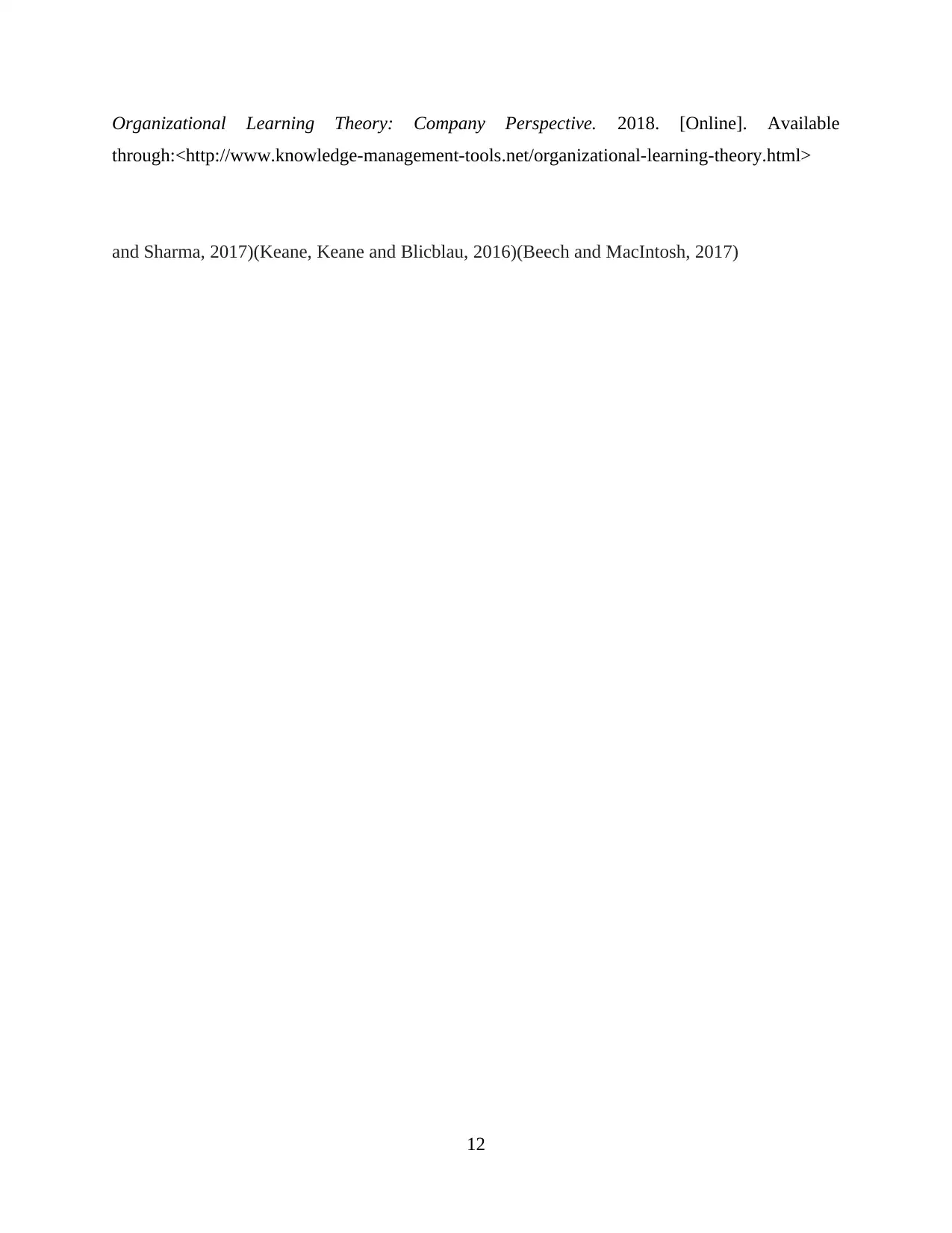
Organizational Learning Theory: Company Perspective. 2018. [Online]. Available
through:<http://www.knowledge-management-tools.net/organizational-learning-theory.html>
and Sharma, 2017)(Keane, Keane and Blicblau, 2016)(Beech and MacIntosh, 2017)
12
through:<http://www.knowledge-management-tools.net/organizational-learning-theory.html>
and Sharma, 2017)(Keane, Keane and Blicblau, 2016)(Beech and MacIntosh, 2017)
12
⊘ This is a preview!⊘
Do you want full access?
Subscribe today to unlock all pages.

Trusted by 1+ million students worldwide
1 out of 12
Related Documents
Your All-in-One AI-Powered Toolkit for Academic Success.
+13062052269
info@desklib.com
Available 24*7 on WhatsApp / Email
![[object Object]](/_next/static/media/star-bottom.7253800d.svg)
Unlock your academic potential
Copyright © 2020–2026 A2Z Services. All Rights Reserved. Developed and managed by ZUCOL.





